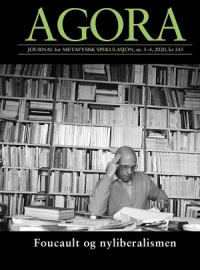(THIS ARTICLE IS MACHINE TRANSLATED by Google from Norwegian)
It is always fascinating to encounter new attempts to illuminate Foucault's concepts and analyzes. I have been moving in this landscape for 25 years. Along the way, I have published an introductory book on Foucault's analytical universe, while my own research has become increasingly influenced by his lecture series on the history of the art of management, given in the spring of 1978 and 1979.
In other words, I am in familiar terrain. Nevertheless, the lyrics manage in Agora No. 3–4 2020 to create new reflections. In several places, I think that the elements that are highlighted, the point of view they are viewed in, and the interpretations it leads to, are both thought-provoking, exciting and enriching.
The long history of the art of management
 It is important to approach Foucault's writing with an open mind. His texts are not created for unvarnished people who want clear answers and fixed theories. On the contrary, we meet an author who is constantly being pushed forward, who asks new questions and seeks new nuances. Foucault refers to himself in line with the crab, which moves sideways and thus can look at the same thing from ever new points of view.
It is important to approach Foucault's writing with an open mind. His texts are not created for unvarnished people who want clear answers and fixed theories. On the contrary, we meet an author who is constantly being pushed forward, who asks new questions and seeks new nuances. Foucault refers to himself in line with the crab, which moves sideways and thus can look at the same thing from ever new points of view.
In this nuanced, moving landscape, there is no simple formula that sums up what Foucault's project was about. This is obvious if the gaze sweeps over the entire authorship, but we also see it when Agora concentrates on the neoliberal lectures from 1979. In addition to translations of two of Foucault's lectures as well as a number of book essays and book reviews, the journal contains six newly written texts. Five of these deal with neoliberalism, one of which was written by me. Of course, I do not have to assess it.
Before we go into the individual texts, it can be mentioned that they all have a retelling of Foucault's neoliberal lectures. The variety in the presentations opens up for both learning, reflection and discussion. In addition, some of us have included the lectures from 1978, which embrace the longer history of the art of governing, from pastoral power via Jesus and the Catholic Church to the emergence of state reason and then liberalism. Several of the contributions also link back to topics dealt with in Foucault's previous books, such as discipline and biopower – at the same time as his thinking is seen in relief against, among other things, Marxism and critical theory.
Innovation economics
With this as a backdrop, let us take a careful dive into the articles by Arne Johan Vetlesen, Knut Ove Eliassen, Sigurd Oppegaard and Kristin Asdal. We start with the outsider. Arne Johan Vetlesen himself says that he moves into matter from the outside and takes time for a thorough reading of the neoliberal lectures. He makes a great and understandable attempt to understand Foucault, but when he considers what he has read, it becomes clear that he is not completely inside the substance. For example, he says that there is a strict distinction between ideas and consequences in Foucault's analysis, but this is not true. The analysis is not a pure idea analysis. What he highlights are discursive practices, where it is precisely the reality-shaping effects that are important.
We increase our human capital and shape ourselves as a profit-maximizing company.
My recommendation to Vetlesen is therefore that he read Kristin Asdal's article, as she tries to clarify Foucault's method: What is he trying to achieve? What is his research strategy? How does he proceed to do his analyzes? The advantage of her angle is that we do not get stuck in what Foucault said in 1979. For me, this is a crucial point. Anyone who wants to be inspired by Foucault cannot elevate his concepts, analyzes and conclusions to eternal truths. If we are to take his thinking seriously, we must be able to ask our own questions, to our own contemporaries.
When Asdal does this, her thinking leads in the direction that we, rather than neoliberalism, should perhaps rather talk about «innovation economy». The features she writes here are largely connected to elements Foucault highlighted, such as human capital, the emphasis that we should all be entrepreneurs, and that the dynamics of the economy must be applied in society as a whole. But it is not a given that the relationships between these elements are the same today. This is analytically important. Much may be the same, but when the links change, the reality becomes different.
Reflection and tools
A good way to avoid being too short-sighted is to look at different thinkers against each other. Sigurd Oppegaard opens an interesting door here, as he compares Foucault's analysis of neoliberalism with Gilles Deleuze's theory of the control society. In the meeting between these two, we understand that what is illuminated is a form of power that is neither about discipline nor totalization. Rather, we face a power aimed at stimulating dynamic activity, where we increase our human capital and shape ourselves as profit-maximizing enterprises.
In line with the art of painting, the art of control requires not only thinking and reflection, but
also tools and techniques.
When Oppegaard translates "government mentality" (or "governmentality") into governing rationality, I still have to protest. This key concept is a pun that weaves two different words together. It is created to capture a practice, something we do when we participate in reflections on and shape intricate control measures (for example, counting edges in academia, or climate quotas in the environmental field). There is no good Norwegian translation of the term, but should we choose something, I prefer management art. In line with the art of painting, the art of control requires not only thinking and reflection, but also tools and techniques. This is how we are introduced to a world that does not distinguish between knowledge and power, reflection and practice – but instead embraces both sides, in mutual breaking, exchange and symbiosis with each other. This is important for anyone who wants to understand Foucault's thinking.
We find this perspective in one of the greats in the Norwegian Foucault landscape. Knut Ove Eliassen's texts are demanding to read, but all the more instructive and clarifying – perhaps especially for those of us who have read some Foucault on our own. Eliassen's article manages to present the theoretical impact of neoliberalism in ways that make me think "of course, that's how it is". In particular, the emphasis on the market, competition and human capital as key concepts opens up for good reflections. At the same time, I find nuances that are worth problematizing, but these are too intricate to discuss in a short review.
In short: I have had a great time reading the latest Agora. Here, texts of significance have been provided not only for the understanding of Foucault, but also for reflections on our own time.


